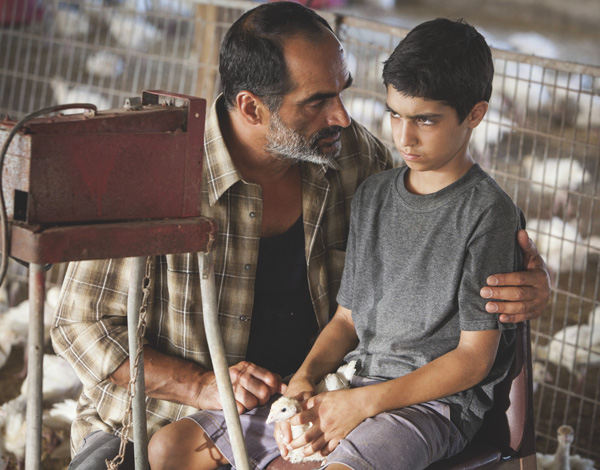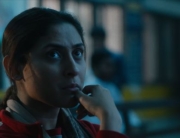There is a quiet eloquence to director Yuval Delshad’s debut film about the conflict between a father and son. With its sparse desert setting, unhurried pacing, and spare dialogue, its 1980s-set story unfolds primarily through facial expression and body language. Yet the burgeoning struggle between man and teen is as palpably intense as any yelling match or fist fight as each refuses to compromise.
Yitzhak (Navid Negahban) has continued to maintain and improve the turkey farm that his father (Rafael Faraj Eliasi) started after immigrating to Israel from Iran when Yitzhak was just a boy. Like his father, Yitzhak expects his son, Moti, to follow in his footsteps, and he is determined to include him in the daily running of the farm. However, Moti has no interest in raising turkeys. His abilities lie in understanding how things work, especially motor vehicles. Still, there is an air of forbearance between the two until Yitzhak’s older brother returns from America for a visit.
Darian (Fariborz David Diaan) never wanted to be a farmer, either, and still resents the cruel determination with which his and Yitzhak’s father tried to force him into the role. Likewise, Darian’s father has never forgiven him for leaving. Yitzhak, for his part, is happy to see his brother again, and they share memories of their once close relationship. But Darian is quick to recognize Moti’s lack of enthusiasm for the farm, and he can’t help but ally himself with his nephew and to provide deserved and insightful praise for Moti’s unrecognized talents.
Things come to a head when Moti neglects his farm duties to work on a go-kart, failing to notice that an equipment failure could have turned into a disaster for the family-run business. Yitzhak’s reaction to Moti’s irresponsibility is to draw a line in the sand that both his son and Uncle Darian refuse to cross.
The film’s location in the Negev desert is familiar territory for the director, whose own family immigrated to the area from Iran. The dialogue is spoken almost entirely in Farsi, and the somber soundtrack incorporates ancient Persian instruments. Delshad elegantly captures the pride of Yitzhak in his way of life and his determination to adhere to his ancestral homeland’s traditions.
As the father, Negahban is a master of subtlety, allowing only brief glimpses of the self-doubt that lies beneath Yitzhak’s evident anger and frustration. Asher Avrahami, surprisingly in his first acting job as the 13-year-old Moti, subtly conveys Moti’s determination not to be forced into a life that he doesn’t want (without once resorting to the teenage eye roll). Viss Elliot Safavi, as the wife and mother, has a sadly limited and repetitive role as the ever patient peacemaker between father and son.
American audiences, used to lingering closing scenes, are likely to find the ending too abrupt to be fully satisfying, but this is nevertheless a good family movie with a universal theme that parents and teens of any ethnicity will find totally relatable.







Leave A Comment